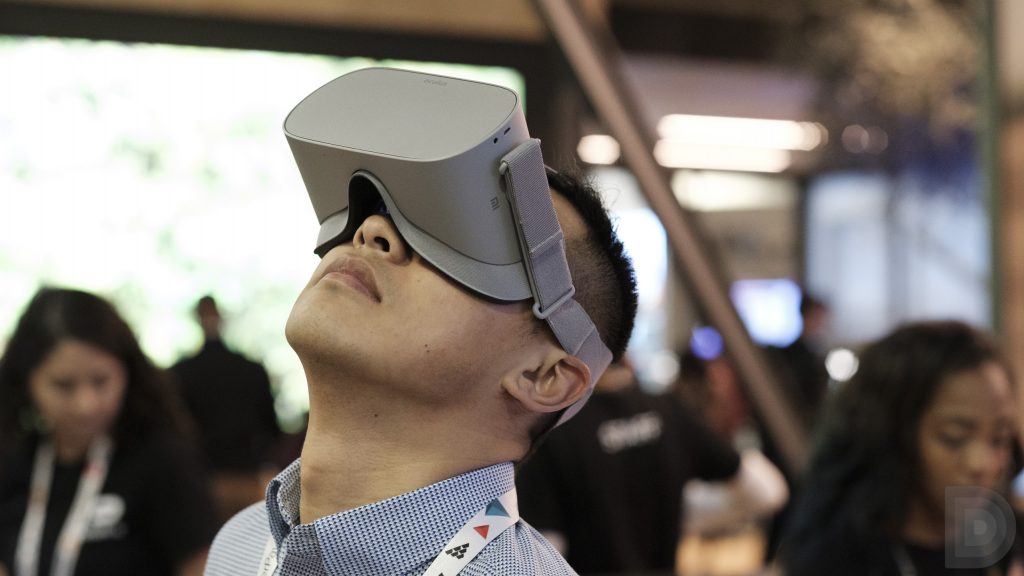Affiliate links on Android Authority may earn us a commission. Learn more.
What is the metaverse and why is it so controversial?

Out of seemingly nowhere, the metaverse has simultaneously become a subject of excitement and controversy over the past few months. While companies like Facebook (or Meta) and Microsoft predict that the metaverse will someday replace the internet, critics argue it’s a marketing gimmick that won’t ever see the light of day. So in this article, let’s explore what the metaverse is, how it could affect our lives in the future, and why it’s such a controversial subject today.
What is the metaverse?

The metaverse is best described as an amalgamation of virtual reality (VR) or augmented reality (AR) and 3D digital worlds. The basic idea is to introduce a sense of presence to the internet — think 3D avatars and synchronized virtual spaces that everyone can share. You could visit a friend’s virtual house in the metaverse using a VR headset, for example, or attend digital concerts and conferences with augmented reality glasses.
To hear Microsoft CEO Satya Nadella say it, his vision of the metaverse isn’t too far off from the way today’s video games work. In an interview with the Financial Times, he said,
Metaverse is essentially about creating games. It is about being able to put people, places, things [in] a physics engine and then having all the people, places, things in the physics engine relate to each other. You and I will be sitting on a conference room table soon with either our avatars or our holograms or even 2D surfaces with surround audio.
Several major tech companies have hopped on the metaverse bandwagon by now, sometimes with varying visions. Social media companies like Facebook are among the loudest proponents today, claiming that the technology will revolutionize the way many of us socialize by the end of this decade. The company even changed its name to Meta to reflect its commitment to the metaverse.
Escapism and building social experiences aren’t the only goals of the metaverse, though. Microsoft believes that the metaverse could make remote work more personal through Microsoft Teams. Video game developers such as Epic Games, meanwhile, hope to create unique worlds beyond what’s possible in the real world. Finally, supporters of decentralized technologies claim that it could enable digital ownership and entire virtual economies.
Does the metaverse exist? When will it arrive?

It’s fair to assume that we’re a few years off from the metaverse most marketing materials promise us, even though some of the basic building blocks already exist today. Even though VR headsets have become relatively affordable over the past few years, they’re still rather niche in the grand scheme of things. Augmented reality hardware like Ray-Ban’s Stories spectacles, meanwhile, have yet to reach technological maturity, let alone affordability and mass appeal.
The metaverse is still a long way off from mass adoption. However, early adopters can participate in smaller-scale experiences right away.
The software industry, however, is confident that compelling applications is all it will take to drive users to the metaverse. Many companies invested significant amounts of money into the technology and we’ve started to see some of it come to fruition of late. Meta, for instance, opened up Horizon Worlds and Workrooms towards the end of 2021, allowing users of its Quest VR headsets to join shared social spaces and collaborate in virtual meeting rooms.
Decentraland, meanwhile, is a virtual world built on top of the decentralized Ethereum network, which means that the platform is largely controlled by its users instead of a singular company. You only need a web browser to explore Decentraland’s 3D world, attend festivals, and play games within the universe. It also offers a peer-to-peer marketplace where you can buy and sell virtual plots of land, using its native Mana cryptocurrency.
Samsung even has its own space in Decentraland titled 837X. It’s modeled after the company’s flagship location in New York City, complete with a theater for launch events like Samsung Unpacked.
Why is the metaverse so controversial?

The ambiguity surrounding the metaverse has earned it quite a bit of criticism. With no tangible product or goal in sight, the technology is little more than a buzzword at the moment. Indeed, a consistent theme emerges if you look closer at the lofty promises — virtually nobody can agree on a single definition or description for the technology. The metaverse could have different meanings depending on whom you ask.
Supporters of the metaverse are optimistic that it will be an open and universal standard, but given the tech industry’s current obsession with walled gardens, it seems unlikely. The more likely reality is that you will be able to visit different metaverse worlds as and when needed — not too dissimilar from modern video games and the internet in general. Even so, many simply cannot see the appeal of living in the metaverse full-time, or even for long periods of time.
The metaverse is a fragmented and dystopian concept right now, making it a tough sell.
Another point of criticism is that several core components that amount to the metaverse have already been around for a long time.
Online virtual worlds and ecosystems, in particular, have existed for nearly two decades in the form of massively multiplayer online games (MMOs). Second Life, for instance, allowed you to create avatars, interact with others in shared social spaces, and even collect in-game currency all the way back in 2003. VRChat, meanwhile, is consistently among the top played virtual reality games on Steam, with tens of thousands of players logging on every single day.
See also: The best VR games for most headsets
Ultimately, if the metaverse is to succeed, it needs to appeal to a broader set of users than just gamers. One thing is clear though: with the amount of investment and talent entering the industry, the idea of a metaverse isn’t going away anytime soon.